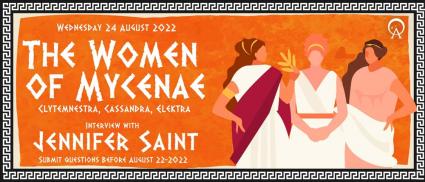
In Homer’s epic Iliad, except for Helen, the women in the Trojan War are mostly relegated to backstage roles, as opposed to the heroic deeds of the warrior kings. Whether the Trojan War was fictional or not, history tells of Bronze Age queens, who were as fierce as their male counterparts in battle and even more competent in ruling their kingdoms in the absence of kings. Personified in fictional characters, the scope of a Mycenaean queen (Clytemnestra), a Trojan princess and prophetess (Cassandra) and a Mycenaean princess (Elektra) draws the curtain to reveal the psyche and circumstances of the hardships, drama and heartache these women had to endure during the war and the conniving tactics they had to apply to survive post war traumas.
Several universal themes such as human sacrifice, rape, slavery, murder, loss of loved ones, abdicating power, revenge and meddling gods emerge as the women had to battle misogynism, male privilege and domestic violence in their male dominated worlds. It was a time of transition when age-old fertility goddesses had to step aside for vengeful warrior gods, reflected in the day-to-day existence of the living.
Their stories are set against the backdrop of the curse on the House of Atreus, ancestor of Agamemnon, where human sacrifice still taints the descendants; the fickle god Apollo who blessed a Trojan princess with prophesy, but also cursed her to know the downfall of her beloved city and royal family, and not being believed, the common fate of rape and slavery of the conquered women and the vengeance of a daughter whose name is immortalized in a psycho-analytical term describing the root of matricide. Like their men and husbands, the women were not all pure and virtuous, but fallible as even the fickle gods did not set examples of morality. Yet they displayed the spiritual bravery and had their voices heard in trailblazing acts of defiance.
Author Jennifer Saint introduces each of these women, Queen Clytemnestra, Princess Cassandra and Princess Elektra, to the audience telling the Bronze Age narrative from a royal woman’s perspective.
--
 Jennifer Saint grew up reading Greek mythology and was always drawn to the untold stories hidden within the myths. She read Classical Studies at King’s College in London and was a high school teacher for 13 years. Jennifer Saint is a Sunday Times bestselling author. Her debut novel, ARIADNE, was shortlisted for Waterstones Book of the Year 2021 and was a finalist in the Goodreads Choice Awards Fantasy category in 2021. ARIADNE tells the legend of Theseus and the Minotaur from the perspective of Ariadne - the woman who made it happen. In her latest novel ELECTRA, (2022) she tells the spellbinding story of three of the women, Queen Clytemnestra wife of Agamemnon and sister to Helen of Troy; Princess Cassandra of Troy, prophetess and later slave and Princess Elektra, daughter of Clytemnestra and Agamemnon, who avenges her father’s death by committing matricide. Jennifer lives in Yorkshire, England, with her husband and two children.
Jennifer Saint grew up reading Greek mythology and was always drawn to the untold stories hidden within the myths. She read Classical Studies at King’s College in London and was a high school teacher for 13 years. Jennifer Saint is a Sunday Times bestselling author. Her debut novel, ARIADNE, was shortlisted for Waterstones Book of the Year 2021 and was a finalist in the Goodreads Choice Awards Fantasy category in 2021. ARIADNE tells the legend of Theseus and the Minotaur from the perspective of Ariadne - the woman who made it happen. In her latest novel ELECTRA, (2022) she tells the spellbinding story of three of the women, Queen Clytemnestra wife of Agamemnon and sister to Helen of Troy; Princess Cassandra of Troy, prophetess and later slave and Princess Elektra, daughter of Clytemnestra and Agamemnon, who avenges her father’s death by committing matricide. Jennifer lives in Yorkshire, England, with her husband and two children.
